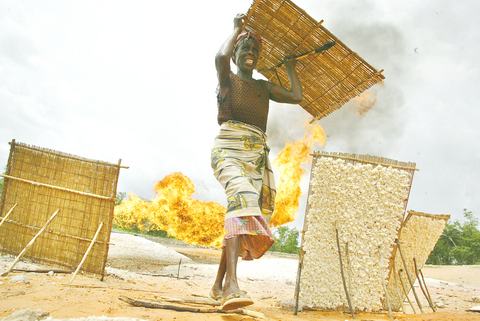Armed militants in Nigeria vowed on Sunday to cut daily oil exports from this West African nation's troubled delta region by another 1 million barrels by the end of this month, as OPEC nations prepared for a strategy meeting in Vienna this week.
A wave of militant assaults on pipelines and oil facilities has already cut production by 455,000 barrels per day in Nigeria, which normally exports 2.5 million barrels of crude daily.
In recent days, militants have repeatedly threatened to escalate the conflict with new attacks and rocket assaults on international oil tankers in Nigerian waters. There have been no new attacks since militants destroyed Shell-operated pipeline on Feb. 20.

PHOTO: AP
In an e-mail to reporters, the militant Movement for the Emancipation of the Niger Delta said "we are going to inflict one huge, crippling blow on the Nigerian oil industry and a most embarrassing attack on the Nigerian government."
"Our target for the month of March is a further cut of 1 million barrels," the email said.
The militant group claims to be fighting for the interests of the people of the Niger Delta region, which has remained poor despite the fact that most of Nigeria's oil is being pumped from it.
Attacks since January have caused severe disruptions to oil exports by Nigeria, one of OPEC's leading producers. The attacks have helped push edgy oil prices higher on international markets.
The Organization of Petroleum Exporting Countries, meets tomorrow in Vienna to map out strategies for the spring and early summer.
Ethnic Ijaw militants took nine foreign oil workers hostages on Feb. 18 and released six of them last week. On Sunday, the militants said they had no plans to release the remaining three -- two Americans and one Briton.
The militant group wants President Olusegun Obasanjo's federal government to release two prominent, jailed Ijaws -- one militant leader accused of treason and a former regional governor held on corruption charges after he fled money laundering charges in Britain. They also want the federal government to increase the region's share of oil wealth.

PRECARIOUS RELATIONS: Commentators in Saudi Arabia accuse the UAE of growing too bold, backing forces at odds with Saudi interests in various conflicts A Saudi Arabian media campaign targeting the United Arab Emirates (UAE) has deepened the Gulf’s worst row in years, stoking fears of a damaging fall-out in the financial heart of the Middle East. Fiery accusations of rights abuses and betrayal have circulated for weeks in state-run and social media after a brief conflict in Yemen, where Saudi airstrikes quelled an offensive by UAE-backed separatists. The United Arab Emirates is “investing in chaos and supporting secessionists” from Libya to Yemen and the Horn of Africa, Saudi Arabia’s al-Ekhbariya TV charged in a report this week. Such invective has been unheard of

‘TERRORIST ATTACK’: The convoy of Brigadier General Hamdi Shukri resulted in the ‘martyrdom of five of our armed forces,’ the Presidential Leadership Council said A blast targeting the convoy of a Saudi Arabian-backed armed group killed five in Yemen’s southern city of Aden and injured the commander of the government-allied unit, officials said on Wednesday. “The treacherous terrorist attack targeting the convoy of Brigadier General Hamdi Shukri, commander of the Second Giants Brigade, resulted in the martyrdom of five of our armed forces heroes and the injury of three others,” Yemen’s Saudi Arabia-backed Presidential Leadership Council said in a statement published by Yemeni news agency Saba. A security source told reporters that a car bomb on the side of the road in the Ja’awla area in

US President Donald Trump on Saturday warned Canada that if it concludes a trade deal with China, he would impose a 100 percent tariff on all goods coming over the border. Relations between the US and its northern neighbor have been rocky since Trump returned to the White House a year ago, with spats over trade and Canadian Prime Minister Mark Carney decrying a “rupture” in the US-led global order. During a visit to Beijing earlier this month, Carney hailed a “new strategic partnership” with China that resulted in a “preliminary, but landmark trade agreement” to reduce tariffs — but

SCAM CLAMPDOWN: About 130 South Korean scam suspects have been sent home since October last year, and 60 more are still waiting for repatriation Dozens of South Koreans allegedly involved in online scams in Cambodia were yesterday returned to South Korea to face investigations in what was the largest group repatriation of Korean criminal suspects from abroad. The 73 South Korean suspects allegedly scammed fellow Koreans out of 48.6 billion won (US$33 million), South Korea said. Upon arrival in South Korea’s Incheon International Airport aboard a chartered plane, the suspects — 65 men and eight women — were sent to police stations. Local TV footage showed the suspects, in handcuffs and wearing masks, being escorted by police officers and boarding buses. They were among about 260 South